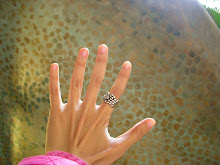and da saga continue...
another chapter of "seeking the true meaning of Happiness..)
Michael Argyle developed the Oxford Happiness Questionnaire[11] as a broad measure of psychological well-being. This has been criticized as an aggregate of self-esteem, sense of purpose, social interest and kindness, sense of humor and aesthetic appreciation.
Though it may be impossible to achieve any comprehensive measure of happiness objectively, some physiological correlates to happiness can be measured through a variety of techniques. Stefan Klein, in his book The Science of Happiness, links the dynamics of neurobiological systems (i.e., dopaminergic, opiate) to the concepts and findings of positive psychology and social psychology
Sunday, November 01, 2009
happiness
What is happines??
un-defined... and TOTALLY subjective matter..
cannot be measured.. therefore it's blissfully tangible ...
Synonyms: ( from http://dictionary.reference.com/browse/happiness )
1, 2. pleasure, joy, exhilaration, bliss, contentedness, delight, enjoyment, satisfaction. Happiness, bliss, contentment, felicity imply an active or passive state of pleasure or pleasurable satisfaction. Happiness results from the possession or attainment of what one considers good: the happiness of visiting one's family. ( this is a total bollocks, why in the world we would seek happiness else where but our selves ?? why human always put happiness in attainment of goods outside them selves....ridiculous! ) Bliss is unalloyed happiness or supreme delight: the bliss of perfect companionship. Contentment is a peaceful kind of happiness in which one rests without desires, even though every wish may not have been gratified: contentment in one's surroundings. Felicity is a formal word for happiness of an especially fortunate or intense kind: to wish a young couple felicity in life.( arghhh.... now you connected happiness to felicity - free from suffering ?? with fortune ?? happiness is beyond those stuff..., happiness is when u no longer need felicity nor fortune,.. wassup with ya people ?? )
http://en.wikipedia.org/wiki/Happiness
Happiness is a state of mind or feeling characterized by contentment, love, satisfaction, pleasure, or joy.[1]
Philosophers and religious thinkers often define happiness in terms of living a good life, or flourishing, rather than simply as an emotion. Happiness in this older sense was used to translate the Greek Eudaimonia, and is still used in virtue ethics.
Happiness forms a central theme of Buddhist teachings. For ultimate freedom from suffering
In Catholicism, the ultimate end of human existence consists in felicity (Latin equivalent to the Greek eudaimonia), or "blessed happiness", described by the thirteenth-century philosopher-theologian Thomas Aquinas as a Beatific Vision of God's essence in the next life
in the Nicomachean Ethics, written in 350 B.C.E., Aristotle stated that happiness (also being well and doing well) is the only thing that humans desire for its own sake, unlike riches, honor, health or friendship. He observed that men sought riches, or honor, or health not only for their own sake but also in order to be happy. Note that eudaimonia, the term we translate as "happiness", is for Aristotle an activity rather than an emotion or a state.
so what is happiness anyway? why its so important for us to find or define or seek one true happiness?? cant we just erase it from human vocabulary, it might will make our life more simple in a way...
un-defined... and TOTALLY subjective matter..
cannot be measured.. therefore it's blissfully tangible ...
Synonyms: ( from http://dictionary.reference.com/browse/happiness )
1, 2. pleasure, joy, exhilaration, bliss, contentedness, delight, enjoyment, satisfaction. Happiness, bliss, contentment, felicity imply an active or passive state of pleasure or pleasurable satisfaction. Happiness results from the possession or attainment of what one considers good: the happiness of visiting one's family. ( this is a total bollocks, why in the world we would seek happiness else where but our selves ?? why human always put happiness in attainment of goods outside them selves....ridiculous! ) Bliss is unalloyed happiness or supreme delight: the bliss of perfect companionship. Contentment is a peaceful kind of happiness in which one rests without desires, even though every wish may not have been gratified: contentment in one's surroundings. Felicity is a formal word for happiness of an especially fortunate or intense kind: to wish a young couple felicity in life.( arghhh.... now you connected happiness to felicity - free from suffering ?? with fortune ?? happiness is beyond those stuff..., happiness is when u no longer need felicity nor fortune,.. wassup with ya people ?? )
http://en.wikipedia.org/wiki/Happiness
Happiness is a state of mind or feeling characterized by contentment, love, satisfaction, pleasure, or joy.[1]
Philosophers and religious thinkers often define happiness in terms of living a good life, or flourishing, rather than simply as an emotion. Happiness in this older sense was used to translate the Greek Eudaimonia, and is still used in virtue ethics.
Happiness forms a central theme of Buddhist teachings. For ultimate freedom from suffering
In Catholicism, the ultimate end of human existence consists in felicity (Latin equivalent to the Greek eudaimonia), or "blessed happiness", described by the thirteenth-century philosopher-theologian Thomas Aquinas as a Beatific Vision of God's essence in the next life
in the Nicomachean Ethics, written in 350 B.C.E., Aristotle stated that happiness (also being well and doing well) is the only thing that humans desire for its own sake, unlike riches, honor, health or friendship. He observed that men sought riches, or honor, or health not only for their own sake but also in order to be happy. Note that eudaimonia, the term we translate as "happiness", is for Aristotle an activity rather than an emotion or a state.
so what is happiness anyway? why its so important for us to find or define or seek one true happiness?? cant we just erase it from human vocabulary, it might will make our life more simple in a way...
Subscribe to:
Comments (Atom)

